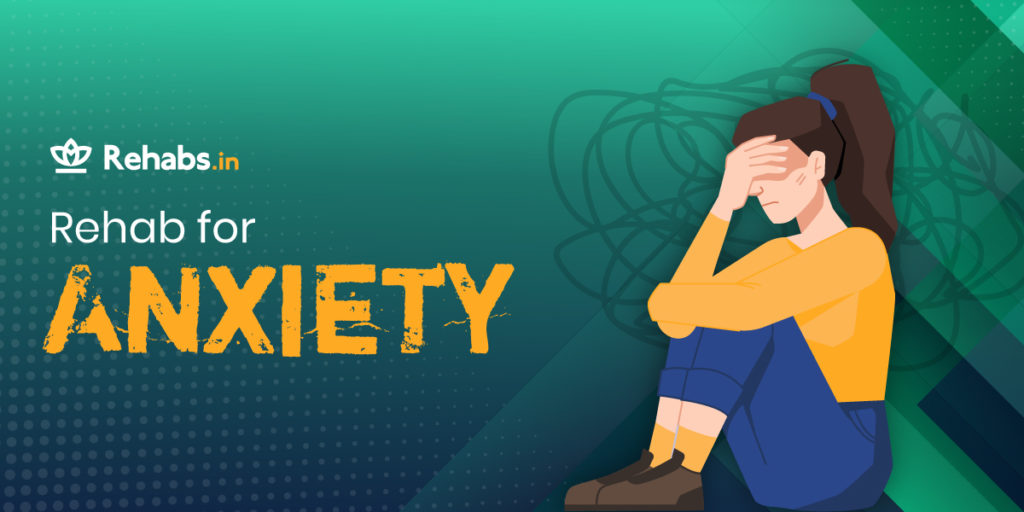Rehab for Anxiety

Anxiety is something that each and every person is familiar with. It is a body’s natural response to stress. However, for some people, anxiety may be more persistent and disproportionate to the amount of stress they face. This can leave them feeling miserable and affect their overall functioning.
The ICD 11 categorises Anxiety disorders into the following:
- Generalized Anxiety Disorder
- Panic Disorder
- Agoraphobia
- Specific Phobia
- Social Anxiety Disorder
- Separation Anxiety Disorder
- Selective mutism
- Other Anxiety or Fear-related Disorders
There are other anxiety-related disorders which have been put in different categories in the ICD 11. Some of them are:
- Obsessive Compulsive Disorder
- Body Dysmorphic Disorder
- Hypochondriasis
We might often think of our body as separate from our mind. But psychological disorders have a significant impact on our physical health. Anxiety comes with many physiological symptoms like increased heart rate, breathlessness, excessive sweating, stomach upsets, et cetera.
Anxiety can be debilitating and can interfere with your daily functionality. The good news is that it is highly treatable. If you are struggling to manage your anxiety symptoms on your own or with outpatient treatment, then residential treatment is something that you can try. Residential treatment can provide round-the-clock care and use a holistic approach rather than just trying to reduce the symptoms.
Most people, when they think of rehab, immediately think about substance use disorders. But rehab centres can help with many other mental health disorders. Residential treatment gives you the highest level of support in your recovery journey.
When to choose rehab for anxiety?
Most people facing symptoms would speak to a mental health expert and seek outpatient treatment. Additionally, they may take some medicines. This is an effective practice. However, this might not work for everyone. Here are a few signs that residential treatment might be a better option for you:
Using substances to cope with anxiety
It is not uncommon for people to smoke or drink to catch a break. When you have anxiety, this becomes a faster downward spiral. What might start as a way to relax may become a compulsion. This can go from short-term relief to long-term dependence which can eventually worsen your symptoms. Even if you are not dependent on the substance, residential rehab can help you break this cycle early.
Co-occurring disorder
Anxiety disorders might co-occur with depression or substance disorders. In that case, finding a centre that deals with both conditions are necessary. Inpatient treatment will be more effective in these cases. Most rehabs offer personalised plans based on your unique needs.
Deteriorating daily functioning
Anxiety can affect your ability to do even the simplest tasks. It may sometimes leave you feeling paralysed with fear. If that’s coming in the way of your daily functioning, then a higher level of care can help you cope with it.
Persistent physiological symptoms
Talk therapies help in learning many strategies to cope with anxiety. While you might feel better psychologically, sometimes the physiological symptoms might persist. Panic attacks are also common in anxiety disorders where you might experience a rapid heartbeat, a strong sense of danger and shortness of breath. When it gets challenging to handle symptoms like sleep disturbances, body pain and headaches, a rehab can provide better assistance and 24/7 medical supervision. Along with a holistic approach that helps you regulate your sleep and diet.
Slow or no progress with Outpatient treatment
In outpatient treatment, you may have sessions once or twice a week for an hour or so. At other times you might be following your usual routine. You might be surrounded by situations that trigger your anxiety. Residential treatment takes you away from those stressors. It enables you to put all your focus on your recovery and provides a safe space.
Effect on relationships
Mental illnesses affect all areas of one’s life. A person with anxiety might feel irritable often, leading to fights with those around them. This can strain your relationships with them. Being in rehab can give you some space. Most rehabs also often invite families as part of treatment. This can help you mend your relationships with them.
How can rehab help you with anxiety?
The main aim of pharmacotherapy is to reduce symptoms of anxiety. Psychotherapy helps you manage your thoughts and emotions and addresses the root of the problem. A rehabilitation centre offers much more than that. Rehabs focus on improving your overall life. Most rehabs use a holistic approach which focuses on body, and soul.
You will be following a schedule based on your treatment plan. Your daily activities might include one on one therapy sessions, group therapy sessions, yoga, massage therapy, meditation, and experiential therapies. Some rehabs also offer family therapy. They focus on teaching skills not just to deal with anxiety but also skills to make life more enriching.
This might include making changes in your lifestyle. Firstly, you’ll stop the use of any substances. There will be a cut down on caffeine or any other harmful foods. Your diet will be filled with nutrients and fresh food. You would be following a routine to get proper sleep and exercise. You can spend time with nature and learn meditation and yoga.
You can contact your choice of rehab and ask them if they intake people with anxiety. You can ask them about their treatment approach and the qualifications of the staff. Once you choose a rehab, an initial assessment will be done, and a treatment plan will be curated for you based on your needs. Many rehabs also give you the autonomy to make changes based on your experiences.
Anxiety can be different for everyone. For some, it might be a result of childhood trauma, for some, it might be the after-effect of a substance abuse disorder. So there is no single treatment that fits everyone. Therapists will spend time with you to understand the root of the problem. Staff at the rehab will provide you with constant support and a safe space where you can entirely focus on your healing. Once you are ready to leave rehab, most rehabs also have after-care plans. This means you can continue getting support as and when required.
Anxiety is highly treatable. Start by speaking to your therapist. Symptoms can go from mild to severe if it’s not treated. If outpatient treatment does not seem enough, a more intensive level of care might just be the right fit for you. To find rehabs that treat anxiety, head over to our curated list here.
Sources:
Bandelow, B., Michaelis, S., & Wedekind, D. (2022). Treatment of anxiety disorders. Dialogues in clinical neuroscience. https://doi.org/10.31887/DCNS.2017.19.2/bbandelow
Beidel, D. C., Turner, S. M., & Dancu, C. V. (1985). Physiological, cognitive and behavioral aspects of social anxiety. Behaviour research and therapy, 23(2), 109-117. https://doi.org/10.1016/0005-7967(85)90019-1
Spielberger, C. D. (Ed.). (2013). Anxiety and behavior. Academic press.
World Health Organization. (2022). ICD-11 for Mortality and Morbidity Statistics (11th ed.). https://icd.who.int/en













